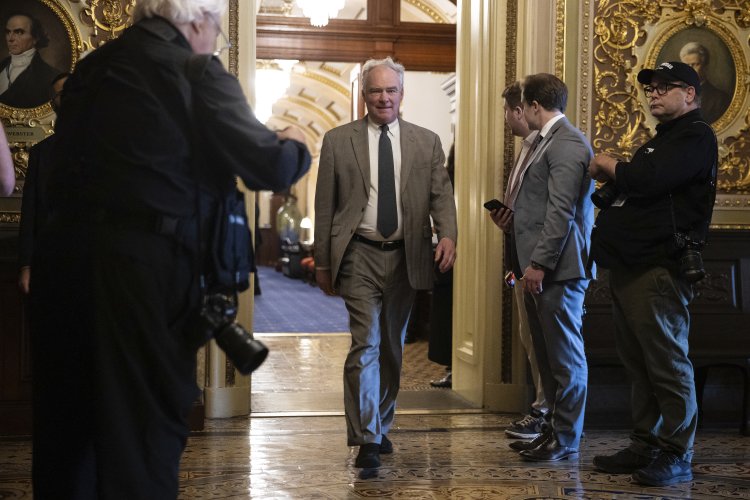Senate Republicans defy Trump, align with Democrats to oppose Canada tariffs
GOP lawmakers turned down a pressure campaign from the Trump administration aimed at enforcing party loyalty on "Liberation Day."

On Wednesday, senators voted 51-48 to reject the national emergency declared by Trump earlier this year, which was intended to support his plan to impose 25 percent tariffs on Canadian imports. This vote coincided with Trump’s announcement from the White House, where he detailed his new tariffs on a variety of products.
Republican Senators Susan Collins, Mitch McConnell, Lisa Murkowski, and Rand Paul joined all Democratic members in supporting a resolution from Senator Tim Kaine, a Democrat from Virginia, aimed at ending the declared national emergency. Paul, representing Kentucky, co-sponsored the resolution.
McConnell greeted Paul with a fist-bump on the Senate floor, and applause erupted as the vote concluded.
While the dissent from these Senate Republicans is primarily symbolic—since Speaker Mike Johnson has already taken steps to block a House vote aimed at terminating the types of national emergencies that Trump uses for imposing tariffs—it marks the first significant split with Trump since he began his second term. The Republican-controlled chamber has generally shown compliance, approving contentious cabinet nominees and allowing the Department of Government Efficiency to cut through federal operations.
Trump had publicly urged GOP lawmakers to oppose the resolution led by Democrats, even reaching out to Collins, Murkowski, McConnell, and Paul to “get on the Republican bandwagon, for a change." Senate Republican leaders also stood united against the resolution.
In an effort to alleviate concerns among Republicans about the implications of escalating the trade war, James Braid, Trump’s chief legislative aide, visited the Hill. However, some senators could not overlook the economic concerns regarding the tariffs on Canada—America's northern neighbor and a key trade partner—especially given the anticipated disruptions to crucial industries in agricultural and border states.
For instance, Collins had voiced concerns about the impact of Trump's tariffs on Canada for her home state of Maine, where industries like lobstering, pulp and paper, and the production of potatoes and blueberries are closely linked to the neighboring country.
"Of course I share the president's goal of stemming the tide of dangerous fentanyl that flows into the U.S. I commend him for taking far stronger actions to halt this dangerous and deadly flow than did the previous administration,” Collins stated on the Senate floor. “I do not, however, agree with his invoking the powers of the International Emergency Economic Powers Act to impose tariffs on Canadian goods and products. The fact is, the vast majority of fentanyl in America comes from the southern border.”
Last month, Trump levied a 10 percent tariff on Canadian oil and a 25 percent tariff on all other goods, aiming to compel Canada to take stronger measures against the flow of undocumented migrants and fentanyl into the United States.
In an interview, Murkowski, representing Alaska, unequivocally stated, “the tariffs on Canada are going to hurt my state. It’s going to hurt our neighbors there.”
After the vote on Wednesday evening, both Murkowski and Collins noted that while White House officials may have attempted to alleviate concerns regarding tariffs ahead of Kaine’s resolution, they did not face direct efforts from the administration to influence their decisions.
Earlier that day, Trump had unveiled tariffs ranging from 10 percent to 50 percent on various countries, fulfilling his commitment to impose reciprocal tariffs on international trade partners, thereby disrupting the global economic landscape.
A number of Republican senators were present in the front row of the Rose Garden during Trump's announcement of his trade plan, which includes a baseline 10 percent tariff on most nations, coupled with higher reciprocal tariffs on around 60 others.
Trump executed this order under the International Emergency Economic Powers Act, arguing that the U.S. trade deficit of $1.2 trillion qualifies as a national emergency. The Senate’s vote on Wednesday aimed to curtail those powers, especially pertaining to the national emergency he declared for the imposition of 25 percent tariffs on Canada.
By the time Trump presented his new trade policy, Collins, Murkowski, McConnell, and Paul had already declared their support for the Kaine resolution. Kaine anticipated that more Republicans would join the cause once they learned about Trump’s planned tariffs. Nonetheless, most Senate Republicans refrained from breaking party lines.
“As you know, I’ve got my issues—I represent a state that is very dependent upon exports,” Senate Majority Leader John Thune mentioned to reporters regarding Trump’s tariff agenda. “That’s always a consideration for me; first and foremost, there’s a home state interest there. But I do appreciate the president's focus on making sure we're getting better deals, and giving business an incentive to do business here in the United States.”
Debra A Smith for TROIB News
Find more stories on Business, Economy and Finance in TROIB business












